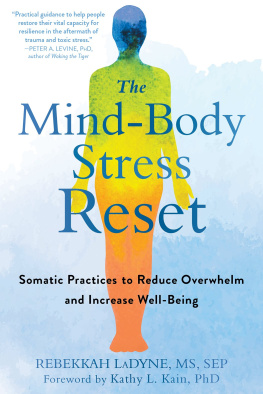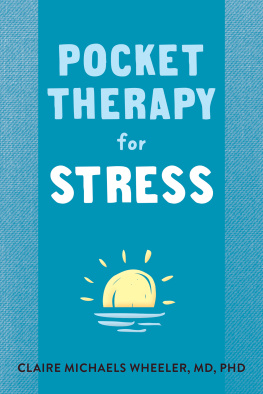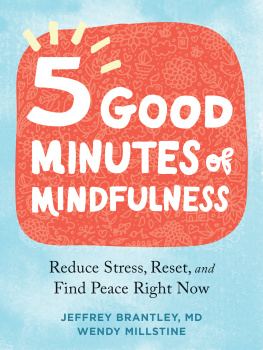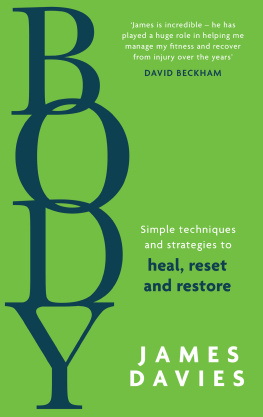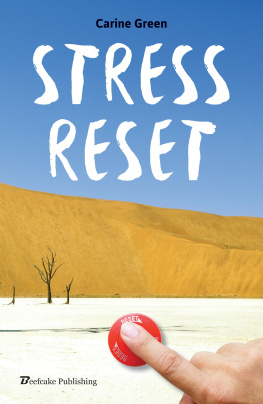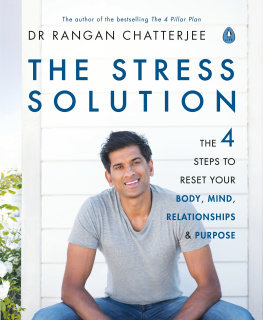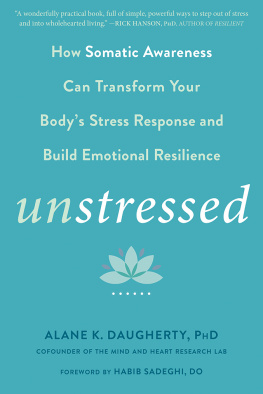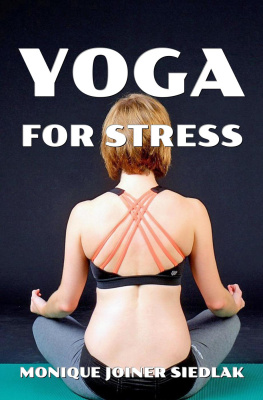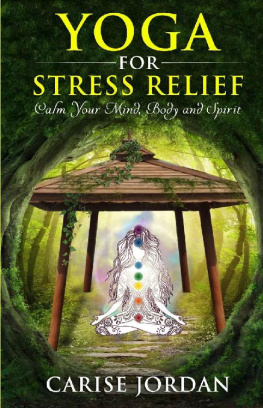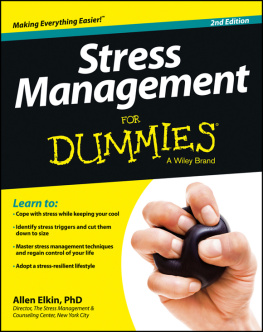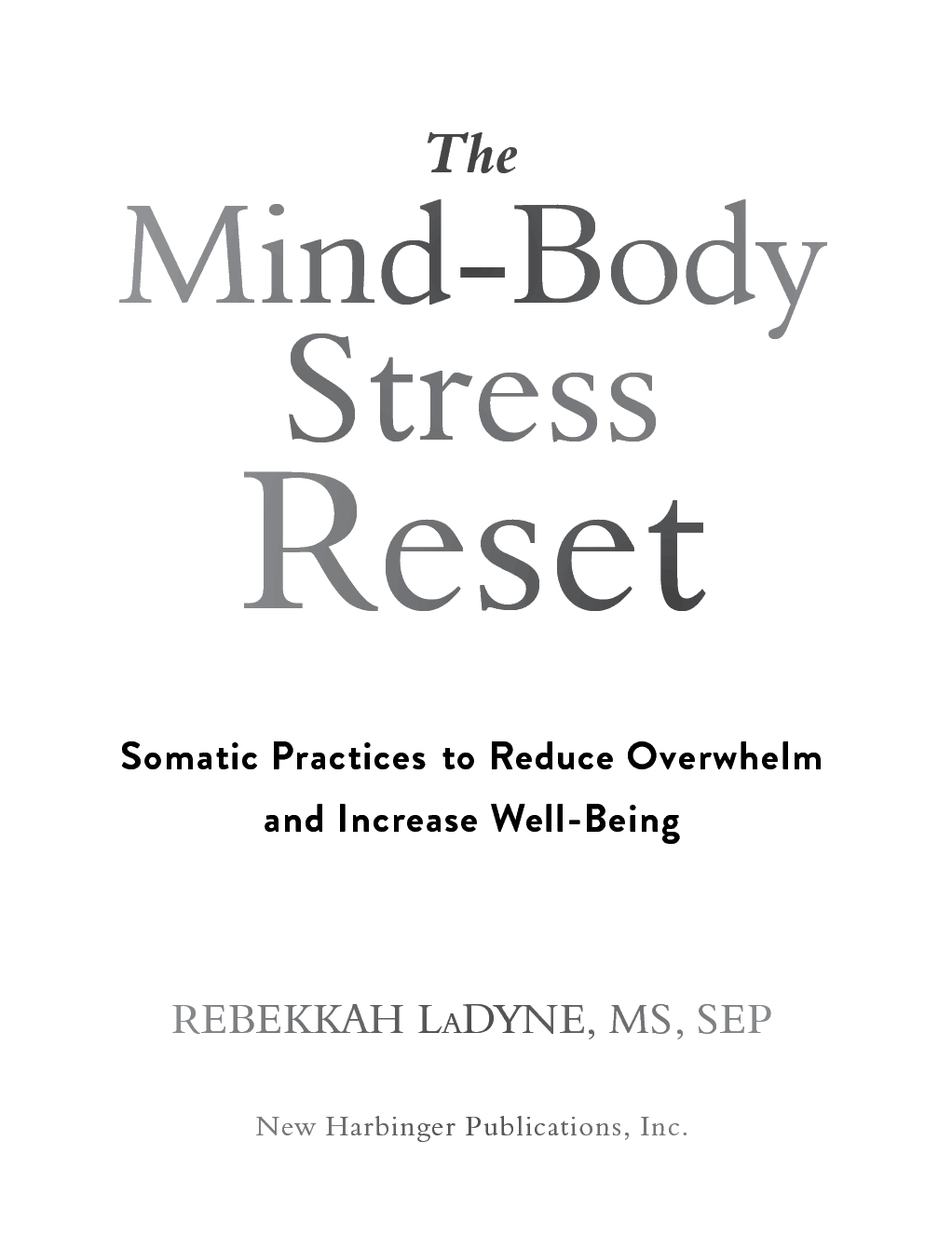The Mind-Body Stress Reset provides clear theoretical and practical guidance to help people restore their vital capacity for resilience in the aftermath of trauma and toxic stress. It does this through simple, well-conceived tools employing body awareness. This book is equally valuable for new therapists, accomplished ones, and to all of those seeking inner balance and wholeness.
Peter A. Levine, PhD , founder of Somatic Experiencing, and author of Waking the Tiger and In an Unspoken Voice
Like a good friend who knows the territory through hard-won personal experience, Rebekkah LaDyne shows that you have everything you need for well-being right inside of you. Written in an engaging, accessible style, The Mind-Body Stress Reset offers simple yet profound science-based tools that train you to self-regulate your stress and connect with your optimal self. You dont have to go down the rabbit hole of your mind. You can learn how to connect with the wisdom of the body that helps you be grounded and not miss the blessing of being alive. A truly excellent contribution.
James Baraz , MA, cofounding teacher at Spirit Rock Meditation Center, and coauthor of Awakening Joy
The Mind-Body Stress Reset does just what the title claims. Drawing deeply from the traditions of somatics, yoga, mindfulness, and contemporary research, Rebekkah LaDyne presents a pragmatic and user-friendly approach to addressing stress in a way that is accessible, useful, and effective!
Mariana Caplan, PhD, MFT , author of Yoga and Psyche and Eyes Wide Open
I highly recommend Rebekkah LaDynes book for anyone who has ever experienced anxiety, worry, and tension. Here is a practical guide for enhancing well-being by building resilience. Her approach is well supported by research on somatic therapies and mind-body medicine. LaDyne shows readers effective skills to reset their mind-body baseline. She challenges us to try the skill exercises and achieve a mind-body reset in our lives.
Donald Moss, PhD , dean of the college of integrative medicine and health sciences at Saybrook University, coauthor of Pathways to Illness and Pathways to Health , and author of Integrative Pathways
A highly readable manual for life! Offering simple yet effective exercises and surveys to identify and survive modern-day stresses. Creatively written with an excellent mixture of science, research, and self-disclosure, all of which give credibility and depth to Rebekkah LaDynes knowledge. I highly recommend.
Ariel Giarretto, LMFT , SEP , Somatic Experiencing Trauma Institute senior faculty, and internationally recognized somatic psychotherapist
In an accessible and easy-to-follow way, Rebekkah LaDyne has given the lay reader a clear way to understand stress responses and how to manage them with simple, straightforward strategies. With lightly humorous writing, LaDyne provides a researched overview that should capture readers creative imaginations to reduce their stress reactions with helpful checklists and exercises that can be done anywhere. The science that supports her writing and ideas is described simply, and will make all readers comfortable in trying the suggestions she offers.
Dave Berger, MFT, PT, SEP , Somatic Experiencing Trauma Institute senior faculty, and internationally recognized somatic psychotherapist
Rebekkah LaDyne combines three powerful and evocative tools: the mental, emotional, and somatic aspects of the human body as long-lasting, natural defenses against stress in a sometimes-chaotic world. By hacking the mind-body connection in concert, her well-supported methods recognize that the body also needs a voice in maintaining balance. It is with joy and respect that I recommend her book to those of us that need help in remembering that balance.
Elena Gillespie, PhD , adjunct faculty of mind-body medicine at Saybrook University, and author of The Anatomy of Death
Rebekkah LaDyne has written a wise, practical, and insightful guide to working with adversity and stress. Weaving relevant theory with evidence-based practice, LaDyne offers a powerful road map for safe and transformative body-based practice. It is clearly written, full of heart, and an outstanding contribution to the field.
David Treleaven, PhD , author of Trauma-Sensitive Mindfulness
Somatic intelligence is often a neglected or rather forgotten territory. Rebekkah LaDyne shows us with her remarkable book how much potential for healing opens up once we invite this intelligence into our consciousness, and give it space to balance out the wounds of trauma and neglect. The book is a wonderful blend of scientifically based theory and playful exercises. I wish the whole world would read itI see it as a guide into health, happiness, and joyful living.
Urs Honauer, PhD, SEP , Somatic Experiencing Trauma Institute senior faculty, and director of the Center for Inner Ecology in Zurich, Switzerland
Publishers Note
This publication is designed to provide accurate and authoritative information in regard to the subject matter covered. It is sold with the understanding that the publisher is not engaged in rendering psychological, financial, legal, or other professional services. If expert assistance or counseling is needed, the services of a competent professional should be sought.
All names of clients in this book have been changed to protect anonymity and many of the persons depicted are composites.
Distributed in Canada by Raincoast Books
Copyright 2020 by Rebekkah LaDyne
New Harbinger Publications, Inc.
5674 Shattuck Avenue
Oakland, CA 94609
Cover design by Amy Daniel
Illustrations by Hayden Foell
Acquired by Elizabeth Hollis Hansen
Edited by Kristi Hein
All Rights Reserved
Library of Congress Cataloging-in-Publication Data on file
Contents
Foreword
Stress is universal. At some point in our lives, nearly every one of us will experience some form of stress. Fortunately, most of us will recover from our stress experiences. However, for some of us stress becomes a more constant companionwe are not recovering from our stress experiences. Alarmingly, the percentage of those who fit in that second category is growing. As Rebekkah notes in her introduction to this book, we can accurately say that stress is an epidemic which is getting worse, not better.
Extreme or chronic stress can have a devastating impact on our ability to be in the world in the way we would like. It can extinguish our creativity, our interest in connection, and our ability to manage our own body responses. It can also contribute to a multitude of physical and emotional symptoms.
Stress is not just in our minds. Stress is deeply somaticthat is, it influences us physiologically in ways that can feel beyond our conscious control. Stress creates ingrained somatic habits that become very difficult to changea kind of automatic response system which influences how we respond to our environment, even how we experience our sense of self. This stress response system can become our default system, often creating responses even before we are consciously aware of whats happening. Our mind is following along behind our somatic responses, not leading them.
One of the frustrating things about this type of stress system is that we often have quite a lot of cognitive awareness and understanding of it and of the things that trigger itand yet, we cant think our way out of it. We may even know what needs to change, but are at sea about how to accomplish that change. In my experience of working with many thousands of people who suffer from varying degrees of stress, true change requires a method that includes the bodyour somatic selfrather than trying to override or suppress its responses.

